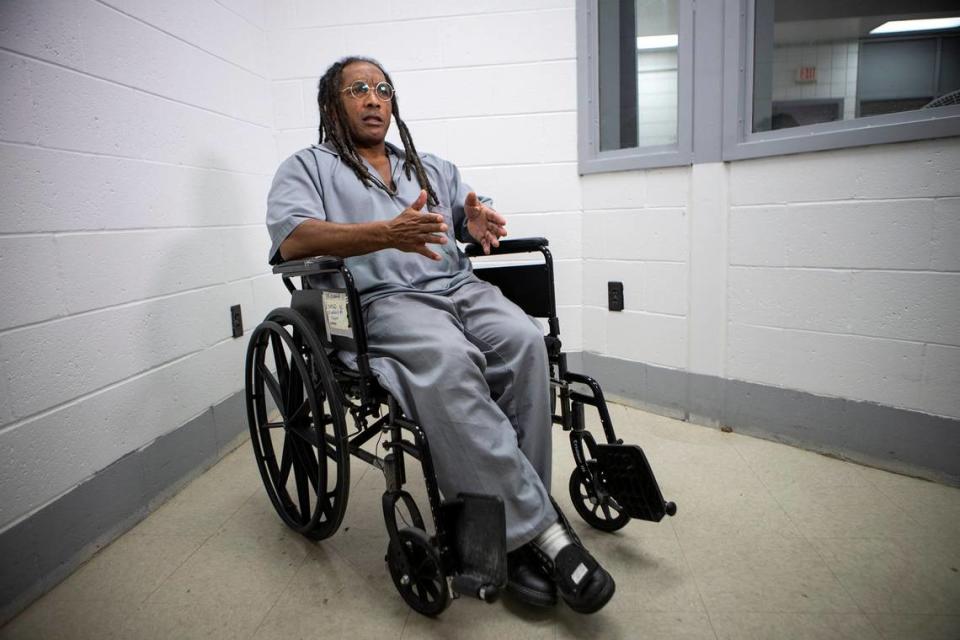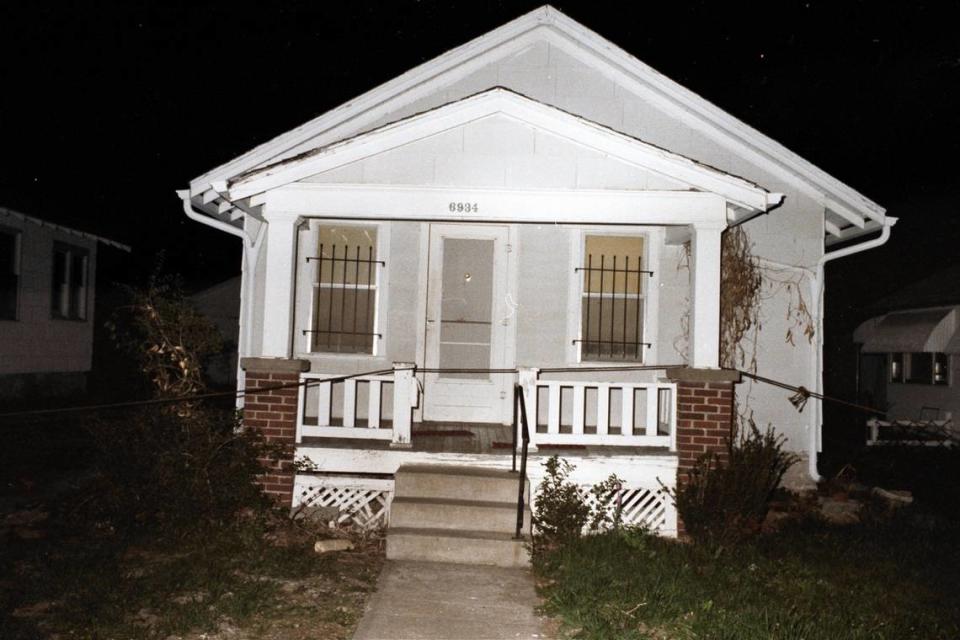Kansas City man is innocent in 1978 murders and should be released, prosecutors say
A Kansas City man has languished in prison for more than 40 years for a triple murder he did not commit, Jackson County’s top prosecutors have determined. They are now calling for his release.
Kevin Strickland, 61, is innocent in the 1978 killings for which he has been imprisoned for more than two-thirds of his life, the Jackson County Prosecutor’s Office has concluded following a monthslong review of his case.
The prosecutor’s office is not alone in calling for Strickland’s release. Federal prosecutors in the Western District of Missouri, as well as Jackson County’s presiding judge, Kansas City Mayor Quinton Lucas and members of the team that convicted Strickland four decades ago now all agree he deserves to be exonerated.
“This is a profound error we must correct now,” Prosecutor Jean Peters Baker said Monday.
The overwhelming support for Strickland’s release, an exceptionally rare occurrence, came in a letter made public Monday after his attorneys filed a petition urging the Missouri Supreme Court to free him immediately. In the letter, Baker and Dan Nelson, Jackson County’s chief deputy prosecutor, said the evidence used to convict Strickland as a teenager has since been “eviscerated.”
“Now that we know, he must be released soon, rather than quibble over procedural hurdles,” Lucas said in the letter. “This man has served 43 years for something he did not do.”
The case against Strickland, who was 18 when he was arrested, was “thin from its inception,” prosecutors say. It rested almost entirely on the dubious identification of a traumatized shooting victim. Prosecutors said they wouldn’t charge Strickland with any crimes if the same case was before them today.
In an investigation published in September, The Star reported that, for decades, two men who pleaded guilty in the killings swore Strickland was not with them and two other accomplices during the April 25, 1978, killings at 6934 S. Benton Ave.
The testimony of Cynthia Douglas, the only eyewitness to the murders who herself was shot, was paramount in the case against Strickland. However, she later said detectives pressured her into identifying him, The Star reported. She tried to recant for years.

Strickland’s petition before the state’s highest court points to other new evidence.
Prosecutors at trial claimed Strickland carried a shotgun during the murders and elicited testimony that no fingerprints on the weapon could be compared. But new forensic testing done this year shows one fingerprint found on the gun is not Strickland’s.
Moreover, a third man suspected in the killings — who the admitted perpetrators say was involved, but who was never charged — now says he knows Strickland was not there that night.
“The State has robbed him of his youth, his health, and much of his life’s potential,” Strickland’s attorneys with the Midwest Innocence Project and the law firm Bryan Cave Leighton Paisner concluded in their petition. “If there has ever been a case befitting the phrase ‘manifest injustice,’ it is this case.”
‘Factually innocent’
Strickland’s first 1979 trial ended in a hung jury of 11 to one, with the only Black juror holding out for acquittal, Strickland remembers. Two months later, he was convicted by an all-white jury of one count of capital murder and two counts of second-degree murder.
That was by design, Strickland’s attorneys said in their petition. His case was marred by constitutional violations, including when prosecutors removed the only four potential Black jurors from serving at his trial, his lawyers contend.
Strickland was the first Jackson County defendant convicted under a then-new sentencing law that landed him in prison for life without the possibility of parole for 50 years. Baker’s office noted that it is not a sentence he could even receive today.
The Jackson County Prosecutor’s Office began reviewing Strickland’s conviction in November after speaking with his lawyers and reviewing The Star’s investigation.
That review included presenting the case to about 20 senior and homicide prosecutors, according to their letter. They determined that new reliable and corroborated evidence proves Strickland is “factually innocent.”
The U.S. Attorney’s Office in the Western District of Missouri, Jackson County Circuit Judge J. Dale Youngs and attorney Tim Dollar — who in 1984 represented the state of Missouri when Strickland filed a motion to vacate his sentence, which was denied — all now agree that Strickland is innocent, according to Baker’s letter.
Nathan Garrett, a member of the Board of Police Commissioners, told prosecutors he found Strickland’s conviction “alarming.” He said the Kansas City Police Department has “no plans to oppose or in any manner hinder Mr. Strickland’s efforts to seek exoneration and effect his release.”
In their letter, Baker and Nelson said Strickland “poses no community danger.” If Strickland were eligible for parole, they don’t know of anyone who would oppose his release, they said.
“Keeping him incarcerated now on a jury verdict, where the jury heard none of this convincing exculpatory evidence, serves no conceivably just purpose,” Baker and Nelson wrote.
Jim Humphrey, the main attorney who prosecuted Strickland, died in 2019. Two members of the prosecution’s 1979 team, however, told Baker’s office that if Humphrey were still alive, he would be leading the charge to free Strickland, given the new evidence.
John O’Connor, who at the time was an investigator for the prosecution and came to know Douglas well, told prosecutors he at first found her recantation hard to believe. But now, he said, it “turns out the wrong person was convicted, simply because she was mistaken.”
O’Connor pointed to an email Douglas sent to the Midwest Innocence Project in 2009, in which she called Strickland “wrongfully charged” and said she would like to help him if she could.
Baker’s office has determined her email was an “unequivocal recantation.”
Strickland is the first incarcerated person who Baker’s Conviction Integrity Unit, which was formed in 2017, has determined is innocent.
Tricia Rojo Bushnell, executive director of the Midwest Innocence Project, said she was not aware of another Kansas City case in which so many officials and agencies called for the release of an innocent man.
“This is certainly a first, at least for Kansas City,” Bushnell said.
Kevin Strickland: inmate 36922
Baker’s office has concluded that the “core claims” made by Vincent Bell — the first suspect to admit guilt in the killings — are credible.
When Bell pleaded guilty in the triple murder in 1979, he provided prosecutors with the most detailed account of the killings. He also repeatedly warned them that they had convicted Strickland, an innocent man, four months earlier.
“I’m telling you the truth today that Kevin Strickland wasn’t there at the house that day,” Bell declared during his three-hour plea.

But by then, Strickland was inmate 36922 in the Missouri Department of Corrections, a prison identification that remains with him today. His case was the first to go to court.
Bell, who was 21 during the shooting, and Kilm Adkins, who was 19, identified their accomplices as 21-year-old Terry Abbott — who was initially considered a suspect but was not arrested — and 16-year-old Paul Holiway, whose name appears in police reports but who was never investigated as a suspect. Abbott, now 64, is in prison in Colorado; Holiway, 59, is a free man.
That night, the group tied up the victims and ransacked the South Benton house, Bell said. Larry Ingram, 21; Douglas’ boyfriend, John Walker, 20; and Douglas’ best friend, Sherrie Black, 22, were each fatally shot.
Adkins was likely the sole shooter, according to the prosecutor’s office. He also tried to shoot Douglas, but the gun did not fire, Strickland’s lawyers say. One of the perpetrators then pulled the trigger of a shotgun, wounding Douglas. She slumped over, pretending she too was dead.
Despite Bell’s assertion of Strickland’s innocence, prosecutors “did nothing” to rectify Strickland’s wrongful conviction, his lawyers argued. Nor did the judge who heard Bell’s confession.
Adkins and Bell spent about 10 years in prison for the murders before they were released in 1989 and 1990, respectively.
Before he died in January, Bell believed Douglas mistook Strickland for Holiway. The two looked alike, according to Strickland’s attorneys. Strickland was 5-foot-3 and weighed 140 pounds, while Holiway was 5-foot-6 and weighed 150 pounds, they said.

Last year, Abbott came “remarkably close” to admitting his own involvement in the murders to an investigator working for Strickland, and he confirmed he knew Strickland “wasn’t there” that night, according to the Midwest Innocence Project.
Strickland remains the only one still behind bars. He maintains he was at home during the shooting, watching TV with his older brother and talking on the phone with his girlfriend — both of whom, to this day, back up his alibi.
A ‘tainted identification’
After the suspects fled South Benton that night, a hysterical Douglas untied herself and limped outside.
She told detectives then that she could identify Bell and Adkins, but not the other two perpetrators.
But the next day, Douglas described the shotgun-wielding suspect to her sister’s boyfriend, Randy Harris, as a short Black man with a lighter complexion. Having heard Douglas’ simple description, Harris suggested the gunman might be Strickland.
Douglas later identified Strickland in a lineup. Detectives told her all she had to do was pick Strickland and “things would be over,” Douglas’ ex-husband wrote in an affidavit.
Strickland’s attorneys say Douglas’ identification was never reliable. She told police she only “got a glance” at the suspect with the shotgun. Douglas also said she shared four to nine joints of marijuana that day, impairing her memory, they said.
And, she was traumatized. She watched her best friend die after she herself was tied up by multiple gunmen.
“Douglas was reporting a belief, formed after the fact and as a result of suggestive input, rather than a genuine memory of having seen or recognized Mr. Strickland at the scene,” concluded Nancy Franklin, an eyewitness expert.
That “tainted identification” was the only direct evidence linking Strickland to the murders, his attorneys say.
Douglas tried to correct her mistaken identification and wanted nothing more than to see Strickland freed, her relatives have said. She died in 2015 at age 57.
Strickland remains at the Western Missouri Correctional Center in Cameron. If Strickland is exonerated, as Douglas had wished, he will have suffered the longest wrongful imprisonment known in Missouri history.
“To know that that day has come, now she can finally rest,” Douglas’ ex-husband, Ronald Richardson, said in July, imagining the day Strickland is freed. “Now, she can finally find peace with it and say, you know, now it’s over. I mean, 40 years later, he’s free, and now I’m free.”

 Yahoo Movies
Yahoo Movies 
